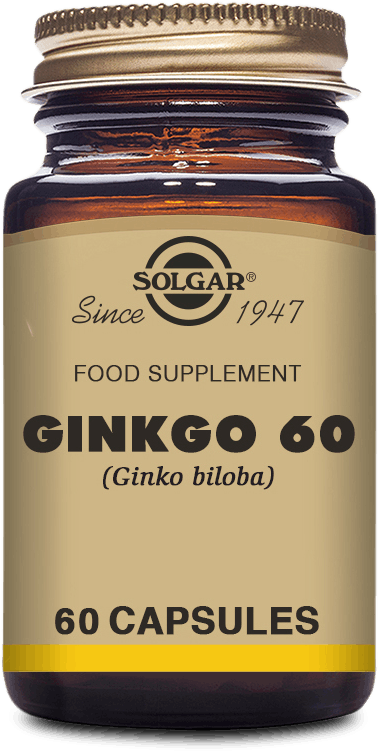Ginkgo biloba
Ginkgo biloba, commonly known as the maidenhair tree, is one of the oldest living tree species, with a history of use in traditional Chinese medicine dating back over a thousand years. It is renowned for its potential health benefits, particularly in enhancing cognitive function and improving blood circulation. Modern research has focused on the extract from its leaves, which contains flavonoids and terpenoids, compounds believed to offer antioxidant and anti-inflammatory effects. Ginkgo biloba is often used to support brain health and address conditions like dementia and Alzheimer's disease, although its effectiveness varies across studies. Key research highlights its potential in improving cognitive function, though more studies are needed to confirm its efficacy.
Key Facts
- Antioxidant Properties: Ginkgo biloba is rich in antioxidants, which help protect cells from damage caused by free radicals, potentially reducing the risk of chronic diseases.
- Cognitive Enhancement: Some studies suggest that Ginkgo biloba may improve cognitive function, particularly in individuals with dementia, though results are inconsistent.
- Active Compounds: The extract contains flavonoids and terpenoids, which are believed to enhance blood circulation and offer neuroprotective benefits.
- Traditional Use: Traditionally, ginkgo seeds and leaves have been used to treat various ailments, including respiratory issues and cognitive impairments.
- Safety and Side Effects: Ginkgo biloba is generally considered safe, but it can cause side effects like dizziness and interact with certain medications.
- Modern Applications: It is used in supplements, tablets, and teas to support brain health and circulatory function.
What does the research say about Ginkgo Biloba and its effects on the body?
Research on Ginkgo biloba indicates that it may have potential benefits for cognitive function, particularly in individuals with dementia. However, the evidence is inconsistent, and some studies show no significant effects on memory or cognitive decline in healthy individuals. Ginkgo biloba is believed to improve blood circulation, which could support brain health.
How is Ginkgo Biloba traditionally used?
Traditionally, Ginkgo biloba has been used in Chinese medicine for centuries to treat various conditions, including respiratory issues, cognitive impairments, and circulatory problems. The seeds and leaves are used differently; seeds are often used for respiratory issues, while leaves are more commonly associated with cognitive benefits.
How should I consume Ginkgo Biloba?
Ginkgo biloba is commonly consumed as a supplement in capsule or tablet form, or as a tea made from the dried leaves. It is important to avoid consuming raw or roasted seeds, as they can be toxic. The recommended dosage varies, but it is generally advised to consult a healthcare provider before starting any new supplement.
Are there any known side effects or precautions when using Ginkgo Biloba?
While Ginkgo biloba is generally safe, it can cause mild side effects such as dizziness, headaches, and allergic reactions. It should be avoided by pregnant women, individuals with bleeding disorders, and those taking certain medications, as it may interact with them or increase the risk of bleeding.
How long does it take to see the benefits of Ginkgo Biloba?
The time it takes to notice the benefits of Ginkgo biloba can vary significantly among individuals. Some people report improvements in cognitive function or blood circulation within a few weeks, while others may not see any effects for months.
What should I look for when purchasing Ginkgo Biloba products?
When purchasing Ginkgo biloba products, it is important to ensure they are from reputable manufacturers and contain standardized extracts. Look for products that specify the amount of active compounds like flavonoids and terpenoids. Additionally, consult with a healthcare provider to determine the appropriate dosage and potential interactions with other medications.
Can Ginkgo Biloba interact with other medications?
Yes, Ginkgo biloba can interact with certain medications, particularly those that affect blood clotting, such as anticoagulants. It may also interfere with diabetes management and reduce the effectiveness of some antidepressants. Always consult a healthcare provider before combining Ginkgo biloba with other medications.
Is Ginkgo Biloba effective for memory enhancement in healthy individuals?
There is limited evidence to suggest that Ginkgo biloba significantly enhances memory in healthy individuals. While some studies indicate modest improvements in cognitive function, most research does not support its use for memory enhancement in healthy people.
Does Ginkgo Biloba have anti-aging properties?
Recent studies have shown that compounds in Ginkgo biloba, such as ginkgolide B, may have anti-aging effects by targeting senescent cells and improving muscle health in animal models. However, more research is needed to confirm these effects in humans.
Sources
- academic.oup.com - 794929
- alzheimersresearchuk.org - ginkgo-biloba
- clevelandclinic.org - 18382-ginkgo-capsules-and-tablets
- ema.europa.eu - final-assessment-report-ginkgo-biloba-l-folium_en.pdf
- jamanetwork.com - 774397
- mayoclinic.org - art-20362032
- medicalnewstoday.com - 263105
- ncbi.nlm.nih.gov - NBK541024
- nccih.nih.gov - ginkgo
- webmd.com - benefits-ginkgo-biloba



